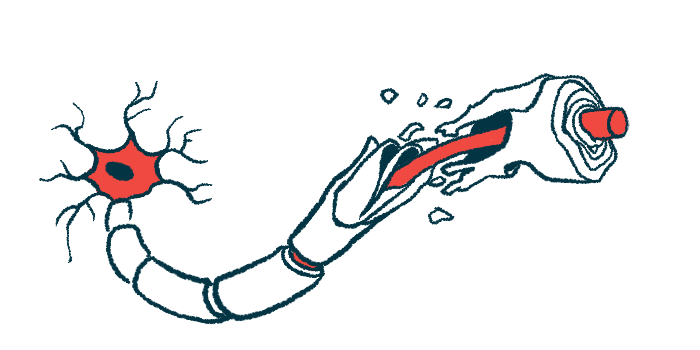MS Spasticity Therapy Baclofen Helps to Repair Myelin: Early Study
The ability to repair myelin may be related to GABA type B receptor activation
Written by |

Baclofen, an approved therapy for spasticity in multiple sclerosis (MS) patients, promoted the repair of myelin — the protective sheath around nerve fibers that’s progressively lost in MS — in a mouse model of the disease, a study showed.
These findings suggest baclofen — sold as oral tablets, oral solution, and injectable formulations — may be a potential therapeutic approach to stimulate myelin repair in people with MS, the researchers noted.
Future studies in MS patients treated with baclofen are needed to confirm these findings.
The study, “GABAB receptor agonist baclofen promotes central nervous system remyelination,” by researchers at the University of the Basque Country, Spain, was published in Glia.
In MS, abnormal immune responses lead to myelin damage and loss (demyelination), impairing nerve cell communication and ultimately resulting in neurodegeneration.
In the brain and spinal cord, myelin damage attracts immature oligodendrocyte precursor cells (OPCs) to the lesion site where they mature into myelin-producing oligodendrocytes capable of restoring the myelin sheath.
“However, in most patients, the efficiency of this process decreases significantly with age and disease progression,” the researchers wrote.
Most available MS treatments work by suppressing immune responses, inflammation, and associated relapses, but there are no approved therapies that can promote myelin repair, or remyelination.
“Therefore, the development of novel treatments that [boost] remyelination is a major goal of current MS research, and includes the repurposing of existing drugs,” the researchers wrote.
Repurposing compounds already approved — and thus tested for safety — for one health condition and using them in another disease helps accelerate the development of a safe and effective treatment, while reducing costs.
In a previous preclinical study, the researchers showed baclofen stimulated OPC maturation via the activation of GABA type B receptors (GABABRs).
GABA is the major suppressive chemical messenger in the brain and spinal cord. It was previously shown to be a key regulator of OPC maturation and myelin production.
Baclofen is the best-known GABABR activator. Injecting baclofen directly into the spinal canal in MS patients was reported to improve cognitive function, which correlated with increases in MRI-assessed myelin content, the research team noted.
Here, the team evaluated baclofen’s remyelinating potential in rodent models of MS.
One of the models consisted of lab-grown rat and mouse brain slices exposed to lysolecithin (LPC), a toxic molecule that promotes demyelination. The other comprised mice injected with LPC into their spinal cord to mimic MS-like disease and demyelination.
A six-day treatment with baclofen at the same time of LPC exposure significantly increased the levels of two major myelin proteins — myelin-associated glycoprotein and myelin basic protein — reaching levels similar or close to those in healthy brain slices.
This effect was not associated with changes in the number of OPCs or mature oligodendrocytes, suggesting “GABABR activation promotes myelin generation by mature [oligodendrocytes] without affecting OPC [growth] capacity,” the researchers wrote.
The team then analyzed the effects of seven days of daily baclofen treatment in the mouse model where lysolecithin had been injected five days before baclofen. The treatment resulted in a significant increase in OPC maturation into oligodendrocytes and in the proportion of remyelinated nerve fibers, or axons.
These data highlight that baclofen treatment “following LPC-induced demyelination accelerates the regeneration of myelin sheaths,” the researchers wrote.
The findings “suggest that [baclofen] repurposing should be considered as a potential therapeutic strategy to stimulate remyelination in patients with MS,” they said.
The team also noted that the mechanisms behind the therapy’s remyelinating effects remain largely unclear as they may be related to the direct activation of GABABR in OPCs and/or by influencing immune cells that facilitate remyelination. It’s also possible that baclofen’s anti-inflammatory and antioxidant effects may help promote OPC maturation and myelin production.
Further studies are needed to clarify this and to “evaluate whether MS patients treated with [baclofen] indeed show evidence of enhanced remyelination,” the researchers wrote.
“This may be an important first step in evaluating the suitability of this drug as a pro-remyelinating/neurorepair agent in MS,” they concluded.
